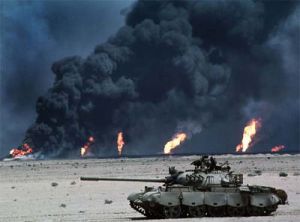If falling rice yields in Asia, water crises in Sudan and hurricanes in the Caribbean were framed not as regional disasters, but as nontraditional security threats to the United States, would policymakers view climate change any differently? A growing literature does just that – it moves climate change from the abstract world of degrees Celsius and melting glaciers in Antarctica, to the jarring arena of national security. The U.S. military in particular is growing steadily more aware that global climate change poses, “a series of global environmental, social, political and possibly military crises loom that the nation will urgently have to address.” While politicians dither and wrangle over specifics it may take the Army’s clout to to show leadership on this area of emerging concern.
Several recently published studies have emphasized how U.S. security is imperiled by a changing climate. A Council on Foreign Relations report highlighted three primary threats: violence and armed conflict, natural disasters and humanitarian crises, and destabilizing forces such as disease or economic collapse. From coca in Colombia to water rights in Yemen and Sudan to oil in Nigeria, natural resource-fueled insurgencies directly affect the U.S. Humanitarian crises can create waves of climate refugees and destabilize already weak states, necessitating intervention. Other forces, such as spreading drought and disease vectors, have similar repercussions on domestic policy. As a recent CNA report on national security and climate change put it, “Climate change acts as a threat multiplier for instability in some of the most volatile regions of the world.”
 At a recent conference in Washington, Brigadier General W. King (Ret.) adroitly linked the issues by pointing out the strong statistical correlations between the failed state index and the major environmental degradation indices. As the latter rises, the former insidiously follows.
At a recent conference in Washington, Brigadier General W. King (Ret.) adroitly linked the issues by pointing out the strong statistical correlations between the failed state index and the major environmental degradation indices. As the latter rises, the former insidiously follows.
These reports may have a disproportionately large impact: in the United States and beyond, the military is widely viewed as being above partisan politics. If a panel of senior officers makes the case that immediate action is needed to allay these threats it may go further than a score of panels by our leading scientists. In the long run, the irony of climate change action being brought to the fore by an organization not known for its tree-hugging ways is a negligible price to pay.



Leave a comment